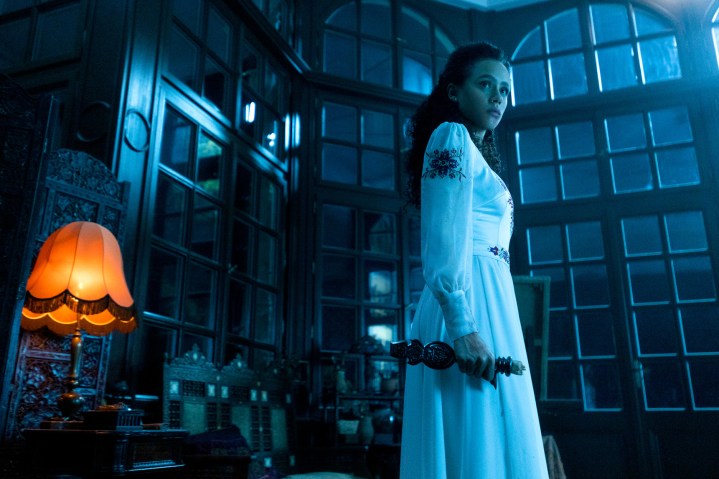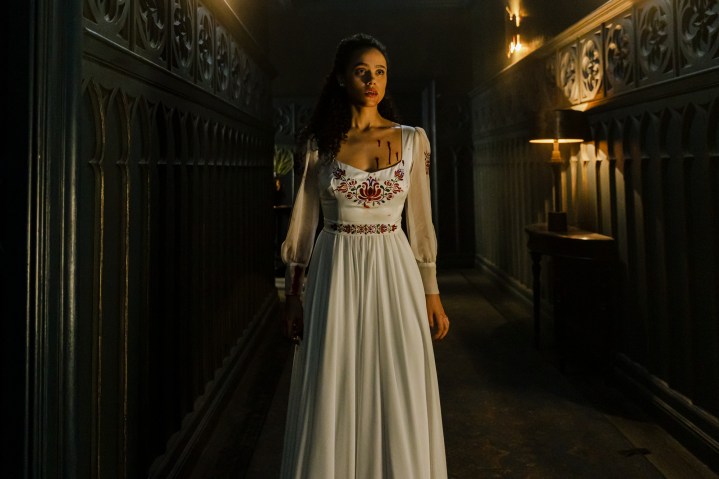The Invitation wears its influences on its sleeve. The film’s moody, effectively spooky opening prologue, which throws viewers headfirst into the deserted halls of a creepy British mansion on one fateful night, feels like something that could have been ripped right out of a Guillermo del Toro film. Its premise, meanwhile, feels so strikingly similar to that of 2019’s Ready or Not that the YouTube page for The Invitation’s spoilerific first trailer is filled with comments comparing the two films.
In a sense, there’s something endearing about how obviously indebted The Invitation is to filmmakers like del Toro and modern horror thrillers like Ready or Not. But The Invitation also makes a classic mistake. It is, after all, commonly understood that acknowledging one’s influences is only a good idea if you’re capable of delivering something that still feels new and fresh. The Invitation doesn’t manage to do either. Instead, the ambitious, overlong new film packs neither the bite nor the thrills present in so many of its genre predecessors.

That’s not to say The Invitation doesn’t try to bring something new to its familiar vampire tale. Rather than adopting the perspective of its central vampires or taking place in a past version of Transylvania, The Invitation begins in modern-day New York City and follows Evie (Nathalie Emmanuel), a struggling artist who makes a living working the kind of catering gigs that force her to navigate crowds of endlessly rude, handsy elites. Evie’s life is turned upside down, however, when she participates in a 23andMe-esque DNA testing program that reveals her ancestral connection to a wealthy family based in England.
When one of her British cousins reaches out and invites her to a family wedding, Evie flies across the pond in the hopes of having the U.K. trip that she and her late mother always wanted to take together. After she arrives, Evie quickly finds herself being courted by Walter (Thomas Doherty), the handsome owner of the impressive British mansion where the film’s central, mysterious wedding is being held. However, as she begins to fall for him, Evie begins to suspect that Walter may be harboring some dark, gruesome secrets.
It shouldn’t come as much of a surprise or spoiler to say that Evie’s suspicions are well-founded. The film’s opening flashback sequence makes that utterly clear, but The Invitation nonetheless attempts to draw out all of its very obvious mysteries for as long as it can. As a result, the film quickly begins to feel overlong and repetitive throughout its second act, which frequently jumps between scenes of Evie and Walter flirting with each other and standalone sequences in which certain unfortunate victims find themselves trapped alone in rooms with mysteriously cloaked figures.

Director Jessica M. Thompson, working off of a script by Blair Butler, attempts to wring as many bone-rattling scares out of The Invitation’s rare horror sequences as possible. However, Thompson’s forced to do so while keeping the identities of certain characters unknown, which leads to several of The Invitation’s scariest sequences being severely underlit. That detail, combined with the actual infrequency of the film’s slasher sequences, lessens the impact of many of The Invitation’s scariest moments.
For her part, Nathalie Emmanuel turns in a charming and likable performance as the woman at the center of The Invitation’s gothic plot, but she’s not ultimately given enough to do in the film. That’s because The Invitation chooses to spend more time developing Walter and Evie’s predictably problematic romance than on her attempts to survive the terrifying situation that she finds herself trapped in. Not only does that creative decision lead to many sections of The Invitation becoming unbearably dull, but it also prevents Emmanuel from getting to fully explore the darker psychological places her character goes in the film’s third act.
If The Invitation’s closing section were more satisfyingly visceral or shocking, the slow-burn nature of its first two acts might not be as damaging to its overall quality. But The Invitation ultimately pulls its punches, delivering a climax that is rushed and jam-packed with expositional info dumps. The film’s eventual resolution comes too quickly and too easily to be a satisfying payoff to Walter’s drawn-out seduction of Evie, and Thompson and Butler’s script refuses to indulge in the same darkly comic violence as Ready or Not or the deliriously gothic sense of romance that Francis Ford Coppola’s 1992 vampire classic Bram Stoker’s Dracula does.

By refusing to take its own story as far as it should, The Invitation ends up feeling like a less eventful, tamer version of the classic horror movies it so clearly wants to honor. It spends so much of its runtime dancing around its various mysteries that the film never gets to be as gory or scary as it ought to be. For most of its story, the gothic brutality promised by its memorable opening sequence only ever pops up in short, blink-and-you’ll-miss-them bursts.
The infectious hysteria of the film’s prologue is only reached again during the memorably bloody banquet sequence that kicks off The Invitation’s third act. Coming off an hour’s worth of build-up, the scene is refreshingly blunt and blood-soaked, but Thompson and Butler’s script also stops it from escalating into a full-fledged horror show.
The same can be said for the entirety of The Invitation, which feels like a vampire movie that has had its feigns filed down. It may exist in the same genre as the films it was influenced by, but it’s not sharp or effective enough on its own to actually draw blood.
The Invitation hits theaters on Friday, August 26.
Editors' Recommendations
- Abigail’s ending, explained
- Like Godzilla x Kong: The New Empire? Then watch these 3 movies right now
- 7 biggest horror movie bombs of all time, ranked by adjusted box office losses
- All the Saw movies, ranked from worst to best
- All the Texas Chainsaw Massacre movies, ranked



